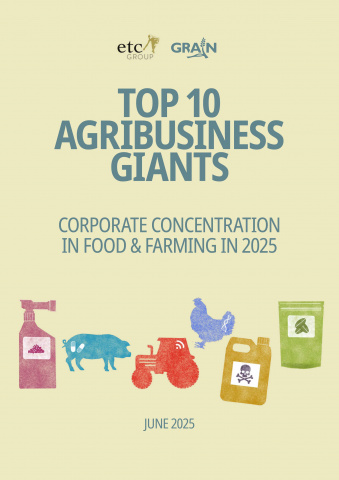Submitted by Ronnie Hall on
Today, a handful of agribusiness corporations have consolidated unprecedented control over the world's food supply, with devastating consequences for farmers, consumers and the planet. This new report by ETC Group and GRAIN reveals just how extreme this corporate control has become. It examines the state of corporate concentration in six sectors critical to agriculture: commercial seeds, pesticides, synthetic fertilisers, farm machinery, animal pharmaceuticals and livestock genetics.
Corporate consolidation is increasing in most of these sectors and four of them-- seeds, pesticides, agricultural machinery and animal pharmaceuticals-- now meet the definition of an oligopoly, in which four companies control more than 40% of a market. Concentration can be even higher at the national level, as is the case with synthetic fertilisers.
In a concentrated market, companies have the power to fix prices and extract money from both producers and consumers, influence policies to favour their interests, and block regulations that protect health and environment. It enables them to suppress alternatives and expand a highly profitable but harmful agricultural model.
Top findings from the report include:
- Oligopolies dominate key sectors: Bayer, Corteva, Syngenta, and BASF control 56% of the global commercial seeds market, and 61% of the pesticides market.
- Profiteering amid global crises: Agribusiness giants have exploited crises like the Ukraine war and the COVID-19 pandemic to inflate prices. Fertiliser companies, for instance, saw revenues soar by 57% from 2020 to 2023, with some accused of price gouging.
- Digital and biotech expansion: Corporations are rapidly integrating AI, gene editing, and digital platforms into agriculture through partnerships with Big Tech companies. These technologies enable data extraction from farmers, facilitate carbon credit schemes, and tighten control over food systems—while raising concerns about biosafety, privacy, and corporate monopolies.
“The industrial food system is not just broken—it’s rigged,” says Mónica Vargas Collazos, researcher at GRAIN. “These corporations are dictating prices, lobbying governments, and crushing alternatives, all while fuelling climate change and biodiversity loss. Urgent action is needed to dismantle their monopoly power and return control to farmers and communities.”
Veronica Villa from ETC says, "Corporate investments in new technologies claiming to address the triple planetary crisis actually only strengthen their chokehold around the food system, ensuring the expansion of a business model that undermines workers’ rights, extracts value from both consumers and producers, and destroys local food systems."
| Attachment | Size |
|---|---|
| 2.72 MB |

